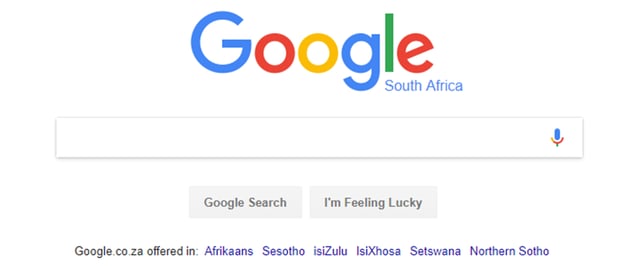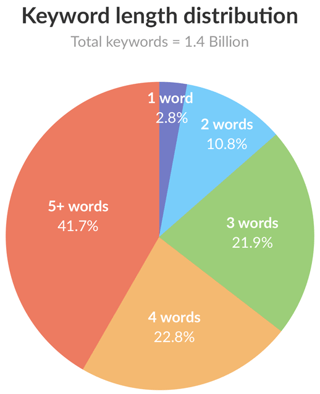Google search has come a long way over the past decade, and the search giant’s latest update ushers in a whole new era of change. 
With Google having announced its first radical makeover since 1996, the world is abuzz with speculations around the future of search. We’ll be saying goodbye to the search bar (that we’ve all come to trust and love), and saying hello to an interest-based newsfeed that looks and feels more like a social media platform.
Google’s already started rolling out their new feed on mobile, and plans to roll out their personalised feed on desktop sometime over the course of the next year (although they haven’t confirmed dates yet). This update will completely change the way we interact with search engines.
GIF source: Tech Crunch
Here’s what’s changed in the past year:
The way we search for information has evolved

Image: Google’s design hasn’t changed much since its inception in 1996.
Ten years ago, people searched for simplistic keywords like, restaurants Johannesburg. As Google’s search algorithms improved, these keywords became phrases (long-tailed keywords) like, where is the closest coffee shop to me? or what is the best pasta restaurant near me?
A year in Google search (2016)
Google’s RankBrain algorithm has evolved beyond “exact match” keywords, making it possible for search results to display content based on a common topic rather than specific words. Google is currently able to understand that when you type running shoes, that track shoes and sneakers are relevant to your query as well.
Today, at least 20% of mobile search queries are in fact voice searches - further illustrating a movement towards more conversational queries. As you can see in the image below, the average search query now contains five or more words:

Image source: Ahrefs long-tail keyword study
Google's latest updates and the future of SEO and search trends
Google’s famous, single field search bar will be replaced with a dashboard which, using advanced machine-learning algorithms, will suggest content to users based on their interests and trending topics around the world.

Image source: The Guardian
The mobile update has already taken effect in the US, and will be systematically rolled out in other countries around the world. Users will be able to follow trending stories directly from their dashboard - without having to physically search for information. This doesn’t mean that the ability to search will no longer exist, however the intuitive feed will predict what news and content would be of interest to you, possibly before you even knew you were looking for it.
In 2018, we’ll be talking topics…
Readers can breathe a sigh of relief, because the future of search and good SEO lies with relevant, excellent quality content. Keyword stuffing is (thankfully) soon to be a thing of the past - with the focus shifting from ranking for keywords, to page rankings instead.
The movement away from exact match and long tailed keywords, in favour of pillar pages and topic clusters, will completely change the way we approach content creation.
How do topic clusters work?
What will search look like in 2030?
In terms of search, we’re moving toward long-form, educational content, personal assistance, voice search, artificial intelligence (AI), virtual reality (VR), and augmented reality (AR). By 2030, Google search will be highly selective of the content which is displayed. It will intuit what you could be searching for before you even start typing into the search bar. Google will weed out mirage content (content which lacks substance) and content which isn’t factually accurate - providing the user with a better quality experience online, and combating content overload.
Search engines will advance to the point where they’re able to understand different accents, speech impediments and languages fluently - making voice search a much smoother process. By then, Google will know what you want, so we’ll see less and less long-tail keywords, and more incognito, voice and mobile searches. Desktop won’t die out entirely - but search will definitely move beyond typing queries into Google.
The Spitfire Inbound team shared some of their predictions for the future of search, here’s what we expect search queries to look like in 2030:
What topics and type of content will we see more of?
We’ll see a rising interest in content like how-to guides and video tutorials. Search topics like current events, humour and entertainment, will always remain popular because sharing triggers will always be relevant.
Search will, however, move towards positive words and phrases. Today we’re surrounded by bad news and negativity, and people have started craving good news. By 2030, people will have shifted towards positive framing, searching things like “how can I help lower my carbon footprint?”. Google will recommend positive articles because more people will be trying to make a difference.
We’ll also see search becoming highly intuitive. So, for example, we’ll start seeing more time-based, relevant content popping into our search feed. At 5pm Google will provide recipes for supper, at 7am in the morning, we’ll see content relevant to our work. Google will be like a personal assistant, providing content in context - because it will understand both.
How will advances in technology and search affect business?
People will expect technology not to fail. Technology, by that time, will be so advanced that it seems simplistic - giving a completely smooth user experience for everyone, not just the technically literate.
By 2030, we’ll be required to be even more agile. By that time, humans will all be working in jobs that are driven by data. We’ll be data aligners, not analysts - we’ll have to be able to make strategic decisions from the data. Artificial intelligence will have taken over most of the “jobs” we’re familiar with today, but humans will still be essential. We’ll need to understand and humanise the data - turning it into actionable information. Bots will analyse the data, but a human will have a deeper insight into the human perspective.
One thing we can count on when it comes to the future of search trends, is that technology will definitely move towards deep-learning and intuitive, personalised search results. The latest Google update will usher in an entirely new era of search, that will disrupt the way businesses currently approach things like SEO, content creation and online advertising.
Stay up to date with all of the latest trends in the digital space by subscribing to the Spitfire Inbound blog. You’ll receive all of our latest content, straight to your inbox.

We’d love to hear your predictions for 2030 too, let us know in the comments!
Featured image credit: Alison Leishman